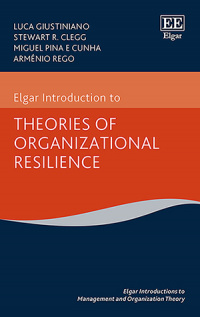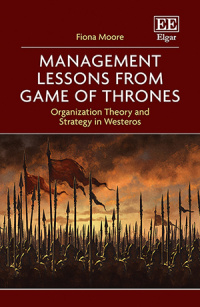Paperback
Elgar Introduction to Theories of Organizational Resilience
与组织环境变得更加不成功table, uncertain and equivocal, the concept of resilience has become increasingly significant for management studies. Resilience connotes organizational, team and individual capacities to absorb external shocks and to learn from them, while simultaneously preparing for and responding to external jolts. This book pinpoints the essential aspects of managerial and organizational resilience and offers insights that stimulate critical thinking. As the concept of resilience is essentially made up of contrasting forces, the volume presents some innovative synthetic interpretation that allows a deeper comprehension of the phenomenon and provides managers and policy-makers with a solid basis for taking their decisions.
More Information
Critical Acclaim
Contents
More Information
与组织环境变得更加不成功table, uncertain and equivocal, the concept of resilience has become increasingly significant for management studies and practice. Resilience connotes organizational, team and individual capacities to absorb external shocks and to learn from them, while simultaneously preparing for and responding to external jolts. This book pinpoints the essential aspects of managerial and organizational resilience and offers insights that stimulate critical thinking. As the concept of resilience is essentially made up of contrasting forces, the volume presents some innovative synthetic interpretation that allows a deeper comprehension of the phenomenon and provides managers and policy-makers with a solid basis for taking their decisions.
This book provides an accessible yet rigorous systematization of individual resilience, team resilience and organizational resilience. Rich with real-life concept illustrations and containing practice-oriented tools, reflection questions and exercises, it shows how resilience can be cultivated across levels of organizational aggregation: individuals, teams, organizations and communities. The authors distinguish individual and collective resilience from related constructs and shed light on the boundaries of resilience and its potential implications for management practice.
Elgar Introduction to Theories of Organizational Resilience will serve as a key resource for graduate students and advanced undergraduate students as well as academics and practitioners who are interested in deepening their understanding of resilience.
This book provides an accessible yet rigorous systematization of individual resilience, team resilience and organizational resilience. Rich with real-life concept illustrations and containing practice-oriented tools, reflection questions and exercises, it shows how resilience can be cultivated across levels of organizational aggregation: individuals, teams, organizations and communities. The authors distinguish individual and collective resilience from related constructs and shed light on the boundaries of resilience and its potential implications for management practice.
Elgar Introduction to Theories of Organizational Resilience will serve as a key resource for graduate students and advanced undergraduate students as well as academics and practitioners who are interested in deepening their understanding of resilience.
Critical Acclaim
‘The Elgar Introduction to Theories of Organizational Resilience sets itself apart from other works by acknowledging the jargon-filled wasteland of meanings that has undermined scholarship in resilience. The book has clear goals: shedding light on the definition of resilience, distinguishing it from related ideas, setting forth models of organizational resilience, and offering a dialectical understanding of the term in practice as a process, dependent on the interaction of adaptation and reaction.’
– Christopher L. Atkinson, International Journal of Public Administration
– Christopher L. Atkinson, International Journal of Public Administration
Contents
Contents: 1. Introduction. The aim and structure of the book 2. Resilience in management and organization studies 3. Resilience in individuals 4. Resilience in collectives 5. The diffusion of resilience via cross-level interactions 6. Resilience as dialectical synthesis 7. Future trajectories for research on resilience Index





